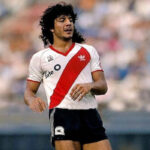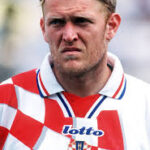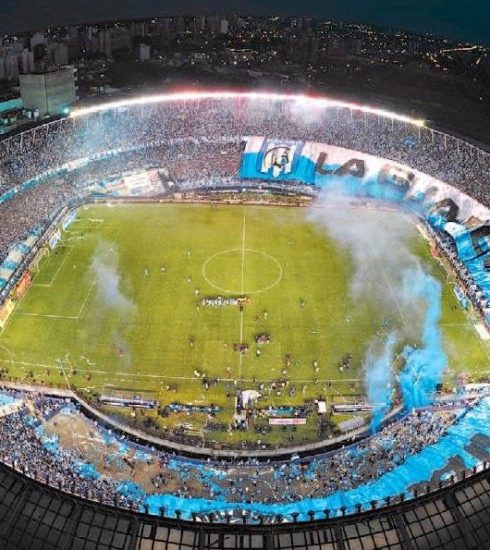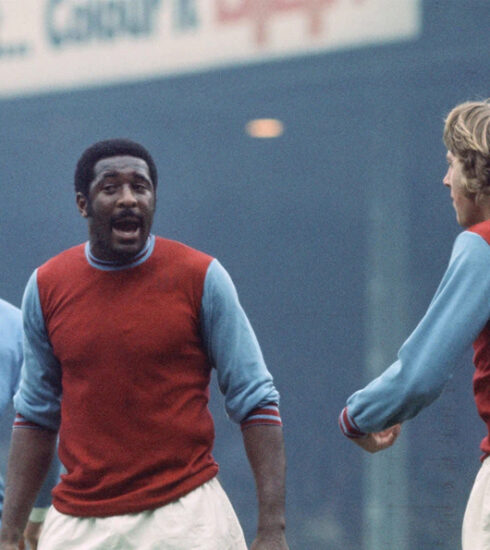ROBERT PROSINECKI: Talent and rebellion



It is still talked about in those parts today.
“I was in the stands that season. I saw him playing in our blue jersey, intoxicating dozens and dozens of opponents with his dribbling, serving ‘ribbon’ assists to footballers who understood his intentions one time in five.
I have seen him kick penalties and corners with a precision I have never seen from anyone else … and I am not just talking about our team.
I have seen him heartening young teammates who stuttered in his presence, who needed a pass that was a metre too long or too short or too crooked, and him cheering them on by clapping his hands while still appreciating their efforts.
I’ve seen him get dirty in the mud of English Second Division pitches (even though it was then called ‘Division One’), I’ve seen him man-marked, kicked or grabbed by the jersey every time he tried to go off on a dribble.
I saw him get pissed off like a hyena when our Manager with five minutes to go in a game where he did things I’d never seen before in our part of the world, never saw again afterwards and never will again, replaced him to get a standing ovation from the whole stadium, opponents included.
He wanted to play every fucking minute of every single game even though they said he didn’t want to train that much, that he smoked one cigarette after another and that he really liked white wine and vodka.”
Even today, in discussions between fans in our Fratton Park, the best way to shut someone up is always the same ‘What the fuck are you talking about? You weren’t here in the 2001-2002 season!”
The 2001-2002 season … there isn’t a single Portsmouth fan who doesn’t remember it.
And those who weren’t there have either had their dad or older brother tell them all about it, or they’ve gone on Youtube and searched for videos of that incredible season.
Because that was the season when ROBERT PROSINECKI played in the PORTSMOUTH FOOTBALL CLUB.
“When the rumour of his arrival began to circulate we were almost afraid to tell it in pubs or offices or factories. To say that Robert Prosinecki, who only three years earlier had shone with his class at the World Cup in France with his Croatia team, was ready to come and play for us, at Portsmouth, in the second tier of English football, would have made you look like a fool or a drunk,’ Pompey fans still remember.
Instead Milan Mandaric, the Serbian tycoon who had taken over the club three seasons earlier, decided to make this ‘gift’ to the fans and the team.
Graham Rix, the former Arsenal and English national team left-back and at the time manager of Portsmouth, is the first to be displeased by the arrival of the great Croatian midfielder.
At the age of 32, Robert may not be the same footballer he was a few seasons ago, but his class, talent and enormous experience can make a decisive contribution to bringing ‘Pompey’ back to the top level of English football.
It now remains to be seen how Prosinecki will approach this Hampshire port town on England’s south coast.
There are many who think that Portsmouth is just one of the last stops for a footballer who, between muscular troubles and various vices, has now reached the end of a brilliant career but who, as they say for intelligent but listless kids, ‘could have done so much more’.
Instead, Robert Prosinecki displaces everyone.
On the pitch, he takes the reins of the game into his own hands, he never hides, on the contrary … he gets annoyed every time an action doesn’t pass from his feet or when his rough teammates decide to throw long balls over his head towards young Peter Crouch, objectively the only one in the team who can think of coming close to the Croatian midfielder in terms of technical qualities and football intelligence.
Graham Rix, who himself is no saint (he suffered imprisonment because of a sexual relationship with an underage girl at the time when he was Gianluca Vialli’s right-hand man at Chelsea) understands that ‘letting go’ on and off the pitch to the Croatian talent is the only way to get the most out of him.
The start of the season is excellent. Just one defeat in the first eight games catapults Portsmouth to the top of Division One. The fans dream of a return to the top flight that has been missing since the 1987-88 season.
It was soon realised, however, that despite Prosinecki’s class and Peter Crouch’s goal-scoring streak, Portsmouth were really not much of a team.
The team, however many goals it manages to score, almost always ends up conceding at least one more. Mandaric’s, Harry Redknapp’s (who was the Technical Director) and Graham Rix’s solution is to replace the old and very experienced Dave Beasant (number 1 in the great Wimbledon days of Fashanu, Wise and Vinnie Jones) with the goalkeeper of the Japanese national team Kawaguchi … thus going from the frying pan to the fire.
The situation precipitates in the first two matches of February.
The first, at home against Barnsley, saw Portsmouth ahead 4 goals to 2 with just six minutes to go.
Prosinecki is on a day of grace.
He dances between the opponents with derisory ease and goes to the net practically as and when he wants. It will be his three of the four goals with which Portsmouth are winning the match.
Despite this Portsmouth will manage to be caught up at 4-4, thus squandering 2 important points in their race towards the play-offs, at that point of the season still a possible goal.
What happened the following week at Bramall Lane against Sheffield United would be even worse.
In the lead with a goal from Crouch at the start the ‘Pompeies’ would find themselves down three goals to one at the end of the first half. First Prosinecki and then Quashie levelled the scoreline … but then conceded a penalty in added time that condemned Graham Rix’s team to yet another defeat.
It was to be the final blow to Portsmouth’s ambitions as they won only two of their last fourteen matches, even flirting with a relegation to the Third Division of English football that would have been sensational.
At the end of the season Robert Prosinecki would leave Fratton Park to return to his homeland, first to Slovenia with Olimpjia and then to Croatia with Zagreb where he would virtually end professional football before embarking, somewhat to the general surprise given his aversion to rules, training and discipline, on the profession of coach.
At Portsmouth, however, no one has forgotten about him.
It was only a few years ago that a poll was held among Pompey fans by ‘The News’, the local newspaper, to elect the all-time eleven in the club’s history.
Well, not only is Robert Prosinecki present, but he is also the only foreign footballer to be part of this eleven.
Robert Prosinecki was born in Schwenningen in West Germany on 12 January 1969.
His father Duro, a Croatian, had emigrated to Germany at the beginning of the decade together with his wife Emilija, a Serbian, in search of work, entering a reception programme organised by the German government for ‘guest workers’ as they were called at the time.
Robert stayed in Germany with his family until the age of 10 when he returned to his native Yugoslavia, but his skills with the ball between his feet were already evident.
At that time, Robert is already part of the youth sector of Stuttgart and is not exactly happy about leaving football and friends to go to a country he does not know except in his parents’ stories.
His first club in Yugoslavia is Dinamo Zagreb but it is clear that Robert can expect much more.
His father and uncle arrange a meeting with the legendary Dragan Dzajic, perhaps the strongest Yugoslav footballer of all time and at the time in charge of Red Star’s youth sector.
When Dzajic saw Prosinecki in action, he was thrilled.
He immediately called the first-team coach Velibor Vasòvic (the man who scored the winning goal for Ajax in the defeat against Rivera and Prati’s AC Milan in the 1969 European Cup final) to see the boy in action.
‘He did things with the ball that only great footballers can do. And then he had this almost disinterested air of someone who is there by chance … but who once on the pitch becomes another person,’ Dzajic remembers of that first meeting.
The tryout convinced everyone and Robert within a few months became an immovable starter in the team, forming with Dragan Stojkovic a central midfield pair of absolute value.
In October 1987, when he was only 18 years old, he was called up by the Yugoslav youth national team for that year’s World Cup in Chile.
The maximum age allowed is 20 and Robert is one of the youngest in the team.
What happens at that World Cup will mark an indelible mark in the history of Yugoslav football and in Robert Prosinecki’s career.
Yugoslavia will win that World Cup and Robert Prosinecki will be voted Best Player of the Tournament. In that Yugoslavia with Robert were Jarni, Boban, Suker, Mijatovic and Stimac … players who would make the history of football in this nation a few years later.
During this competition something unexpected and very significant happened to understand Prosinecki’s importance and skill.
At the end of the first qualifying round, Red Star warned the Yugoslav federation not to use Prosinecki in the remainder of the tournament. The Belgrade club wants the young point guard back. There is an important Uefa Cup round against Belgium’s Bruges just around the corner and Robert is deemed indispensable. It almost came to a clash before even Joao Havelange, the Brazilian ‘deus ex machina’ of FIFA, unravelled the situation by agreeing with the Yugoslav national team and preventing Robert’s early return to Red Star.
In 1991, with the country on the brink of a disastrous and absurd civil war, for Red Star came the triumph in Europe’s top competition.
However, this coincidence meant the end of this great team and of the Yugoslav national team, which at the time was in all probability among the three strongest in the world.
The protagonists of that fantastic European success became the main targets of all the biggest European clubs.
For Prosinecki even Real Madrid moves, which in a period objectively among the least happy in its history is looking for new blood to return to the top.
Prosinecki is welcomed as a demigod in Madrid but, due to a series of muscle injuries, he will not even remotely be able to express himself at his usual level.
As is often the case in these cases, the search is on for real or supposed causes for the poor performance, and Robert’s less-than-athletic life ends up in the spotlight.
The fact is that apart from perhaps the last season when injuries leave him relatively alone, Robert will never be at Real Madrid the player he was at Red Star.
After an excellent season at Real Oviedo, always with Radomir Antic on the bench (and where Robert can be himself and, above all, where the ball ALWAYS passes from his feet and he does not have to share it with other ‘stars’) it seems almost done for the Croatian director’s return to a big club. It is the ‘Colchoneros’ of Atletico de Madrid who are about to close the deal. In fact, the volcanic President Gil has recruited Antic from Oviedo, and as his first purchase, he is asking for his protégé Prosinecki.
At the last moment, however, Barcelona stepped in and, with great cunning, ‘worked’ Prosinecki’s attorney and even managed to get the player from Real Madrid without paying a single pesos!
But here too, as at Real, history repeats itself. Robert Prosinecki just can’t seem to get off the ground, largely due to the usual physical problems, and by the time he returns, it is clear that Johann Cruyff has already made his hierarchies perfectly clear, which do not include the Croatian as one of the team’s main points of reference.
The following year he moved to Sevilla and things went a little better, even though by now it was clear to everyone that between injuries and lifestyle Prosinecki had, at only 28 years old, already given his best.
He returned home to his old club, which became Croatia Zagreb after the creation of the Croatian Nation. It is celebrated as the return of the prodigal son and Robert does not disappoint expectations.
In addition to championship triumphs for the Croatian team came two consecutive seasons in the Champions League, which fans will forever remember for some excellent performances such as against Celtic, Porto and a draw at Old Trafford against Manchester United.
European sirens returned for Robert Prosinecki, who spent half a season in Belgium at Standard Liege before his English adventure at Portsmouth in the 2001-2002 season.

ANECDOTES AND TRIVIA
At the end of the drawn match with Barnsley of which we speak above, team-mates confirm that Prosinecki was so angry at the end of the game that he went into the changing room, lit a cigarette and came out of the dressing room still wearing his shirt and shorts and full of mud from head to toe … getting into his Mercedes as he was before heading home.
One of the main sources of anecdotes is Peter Crouch, the very strong striker who was making a name for himself at Portsmouth at that time.
As well as remembering that at least two thirds of his goals that season (as many as 19) were served to him on a silver platter by Prosinecki himself, the tall English striker remembers that Prosinecki used to smoke a moment before going out onto the pitch, during half-time in the toilet and it was the first thing he did as soon as he came back in at the end of the game.
Crouch also remembers that Prosinecki did not speak much, especially in public, but in two-way conversations he always answered in perfect English … but whenever he was asked something in public his answer was invariably ‘Sorry, i don’t understand’!
During his season at Portsmouth more than once the opponents themselves ended up complimenting Prosinecki at the end of the game.
Best of all was Marlon Harewood, the mighty Nottingham centre-forward, who in the subway before taking the field approached Prosinecki almost in disbelief to see him so close and said ‘Man, you’re a legend. It’s an honour for me to play in the same game as you’ … And Crouch guarantees that from Prosinecki’s smile he understood everything word for word!
Also at Portsmouth, teammates recall that one of the things that annoyed Robert most was the requirement to wear a uniform for official matches. For him, the clothes were a pair of jeans, a T-shirt and a cardigan. The end.
The smoking habit was at such a level that Robert asked Kevin Mc Cormack, the club’s warehouse keeper, to wait for him with a lit cigarette at half-time … so that he could smoke at least two … one on the way back to the changing room and the other locked in the bathroom while the manager talked about the game and gave instructions for the second half … for Robert it was always “Sorry, I don’t understand”!
When he was at Real Madrid the only one who managed to get good performances from Prosinecki was his last coach, the great sage Vicente del Bosque.
“There is no disputing the fact that Robert is an individualist and that he is in love with the ball. He often received a lot of booing for his mania to keep the ball between his feet for a long time … but most of the time I can assure you that he did it because there were no better solutions!”
Finally Robert himself on his vices
“If it wasn’t for spritzer (white wine and mineral water) I would have been the greatest footballer in the world !” he said shortly after his retirement.
“I know that smoking is certainly not the best thing for an athlete, but in the end it is the only real vice I have. … and besides, nobody lives more than a hundred years …”
Ladies and gentlemen … Robert Prosinecki.
ROBERT PROSINECKI is one of 27 biographies told in https://www.urbone.eu/products/mavericks-cult-heroes-del-calcio-britannico-27-biografie-di-calciatori-che-hanno-in-qualche-modo-lasciato-il-segno-nella-storia-del-calcio-britannico-degli-ultimi-cinquantanni.






